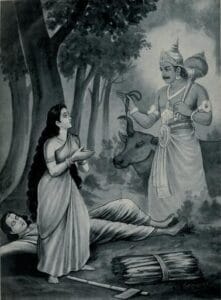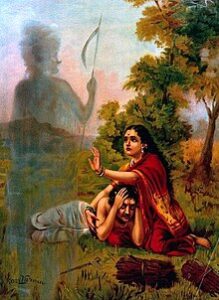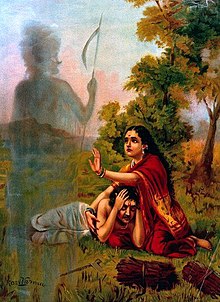Have you been one of those girls who dislike smoking, refused alcohol offered at the party, or rejected the casual moves of a lewdly interested guy and jeered as ‘Sati-Savitri’?
You are not alone. Welcome to the new world away from the aggressive ‘Slut shaming’ to the passive-aggressive ‘Savitri shaming.’
But a Savitri is not always unwelcome. It is a title conferred to the most chaste of all women. Especially, a “Savitri” is much in demand in the market of marriages, more so in arranged ones. Homely, wearing traditional clothes, and mostly mute. But, since we are a progressive society now we accept ‘modern working Savitri’ too, one who does a full-time job and takes care of the entire household chores without any participation from her partner.
Savitri has been the epitome of conjugal fidelity in patriarchal Hindu society. Every year women across the country observe a fast in her name for the well-being and long lives of their husbands. In mainstream culture, stories, and movies, a “savitri” always wins over her love and snatches away the “hero” from the shackle of ‘unsanskari non-Savitri.’(characterized by western clothes, mostly working in offices, occasionally drinking or smoking – you see antonym of Savitri). The keyword is unconditional devotion for the partner.
But she has been a controversial topic. While the conservatives applaud her as a docile, meek, obedient, and of course virtuous married woman, she is uncool for the faster generation for resonating with the seeds of patriarchy.
Now, who was Savitri?
Savitri is introduced in the epic Mahabharata as Satyavan’s beautiful and loyal wife, who was able to revive him after his demise by impressing Yama (the God of Death) with her devotion.
But is that a complete definition of Savitri? Her devotion to her husband, Satyavan is what makes Savitri?
Fortunately, no. Savitri stood for everything which a modern feminist shall strive for – independence, assertiveness, devotion, wisdom, intelligence, and a fighting spirit. As the story of Savitri-Satyavan passed through generations, the patriarchal society conveniently missed that part. While she is a character worthy to be worshiped, the reasons for which she is upheld may not be the entire truth.
So this International Women’s Day, I will discuss this extremely intelligent woman character from mythology who gets the better of the powerful, unmovable god of Death through sheer determination and the gift of gab.

The story
Savitri was born to the royal couple of Madra, King Aswapati, and her wife Kaushalya as a blessing of Devi Savitri. She was named after the Goddess hence. As she grew up, her celestial aura made it impossible to find a suitable match for her. So with the permission of her father, she set out to find her mate. She was independent to make her own decision about her husband. Unthinkable, isn’t it?
And she was smitten after meeting Satyavan, the banished prince, living a modest exile life. What prompted a wise princess to fall head over heels for him after rejecting every other suitor might be a mystery. But then who has understood the law of love anyways?
Once Savitri decided, she shares her decision with her father. Sage Narada who happened to be present at the King’s court at that time however points out that though he endorses Savitri’s choice, Satyavan is prophesied to die within another year. This makes the father apprehensive, but the daughter stays confident. She proclaims death is a game of destiny and sticks to her choice. My life, my choice. Isn’t that the preaching of feminism?
Her assertiveness wins over her father and she weds her love. Once married, she takes up the duty of the new household without any complaint. Leaving her princess privilege she accepts the hardship of life. Because that is what a strong woman does, do her duty with respect. In her tryst with destiny time and again she demonstrates her self-confidence and never-say-die attitude.
Fate, death, and survival
After a blissful year, the dreaded day arrives and Satyavan breathes his last in Savitri’s embrace. God of death, Yama arrives to do his duty and faces the determined Savitri, a fearless wife ready to challenge destiny.
She stands strong, doesn’t beg or put up a futile fight but, refuses to leave her husband and follows him into realms of the dead. Her argument about the virtues of obedience to dharma and then, the company of good people wins even the fearful God of death. Her wisdom impressed him and each time she defeats him with one of her arguments, Yama offers her a boon — any boon except the return of her husband’s life.

The intelligent woman firsts ask restoration of her blind father-in-law’s sight, then she asks the for returning the Kingdom of the exiled king. And finally, she asks Yama that she be the mother of a hundred sons. Bound by his promise Yama had to grant her all the boons but was trapped with the last wish which was impossible with Satyavan’s death. Yama was at last compelled to return Satya van’s life and Savitri won back her husband.
Savitri A Feminist Epic
Savitri plays a pivotal role in breaking the conventional trends of contemporary society and literature where male characters dominate the domain. She does not need a hero to save her, rather her unassuming wit and fervor win the day.
It was her iron will and extraordinary intellect that Yama had honored. Over the centuries the men wanted us to forget that part of the story. They played an image of an obedient, devoted wife to portray this unusual woman.
If we look at the story closely we understand how she rises above that narrow viewpoint. She was a true feminist icon who learned to face destiny heads on.
Sri Aurobindo’s magnum opus titled ‘Savitri- a Legend and a Symbol’ celebrates that bravery.
She is the one who strives to bring happiness to the world and does not believe in escapism. Savitri did not only change her own destiny but the destiny of her husband, her father-in-law, and probably crores of women who admire her.
As a true feminist, she teaches one to make a choice and remain assertive about it. Her humbleness and calm demeanor won over the most fearful being, the Death and she turned stars in her favor with her knowledge and wisdom. It is time we learn to see her as the woman icon who broke many stereotypes and not stereotype as the devotional tool, the popular culture, the patriarchal society try to present her as.
-X-
This blog post is a part of the Women’s Day Blog Hop, themed on She: A Tribute to Her, hosted by Swarnali Nath.
P.S. This post is part of Blogchatter’s CauseAChatter


When she decided to come her groom, Savitri went ahead of her time at the very moment. This post gave a new way looking at Savitri. Her example shows when a woman decide something then she can fight even with her destiny.
Thanks for reading and resonating
Though I have read Savitri’s story in childhood, today, as an adult, I read her story and her role as a feminist model through your post. Kudos to you for the research behind this post. How wonderfully you have brought so many aspects of her. Thanks for joining the blog hop. Means a lot. Much gratitude
Thanks for reading it. You never read her As a feminist icon because society does not want to highlight that they are more comfortable with docile, obedient and devoted ‘wife’ and not some woman who thinks for herself
In every era, women have always been strong. No mattter what may come, they stand still and strong. This is to remind people centuries after centuries that you can’t banish ladies for your own good.
Yes women think too and is not a second fiddle like the society wants you to believe. Thanks for reading
I loved how you’ve mentioned the feminist characteristics of Savitri and how she was a torch bearer for the modern day women. The writeup is historic, revolutionary and an eye opener for the ones who’ve been doing passive aggressive Savitri shaming. Great writeup!
Thanks a lot for resonating with my thought.
It’s amazing to know Savitri from this point of view. When I would hear stories from the past, I would always wonder why the women who were behind all the great things that happened were not given any credit. Your post said it all.
Thanks w lot for reading the post and agreeing to the view point
A big thank you to you for bringing to light. I, for one, was unaware of this side of the story and always felt the title of ‘sati savitri’ to be regressive. A lot of women (and men) will learn their lesson from this post.
A great topic, very well written, Sreeparna.
Cheers!
Your interpretation of the myth is one of the many possible ones. Like it.
I’ve grown up listening to Satyavan Savitri’s story but never gave it a thought from feminists perspective. Loved your take on it.
Our mythologies have feminists and we are struggling for our rights in 2023. I have read the story of Savitri as a child, but it didn’t leave a lasting impact. You have etched it so well. Savitri stands out like a true woman’s libber. Hats off to her and to you for choosing such an iconic woman.
I had read and listen the story of savitri before and it was great to read it again with your post. you have chosen such a strong mythological character to write for blog hop. indeed, a unique response to theme. your post will help lots of people to know more Savitri and her bravery.
Thanks a lot for reading
Well expressed. She is an example of woman-power.
Sabitri had chosen her groom and she proved to be such a boon for his family and him while smartly earning boons from Yamaraj!
Sabitri is a role-model though many think being “Sati-Savitri” is regressive.
In Odisha, there is “Sabitri Puja” when married women fast & pray to Goddess Sabitri for the long life of their husbands. Sabitri’s life story is read and she is celebrated.
I kNow about the Sabitri Puja… BUT that has come down to praying for husband’s long life and I want to point out that she was Much more than devotion. Women who are doing the vrat should imbibe the other characteristics of her and stand for themselves
This is such an amazing take on the tale that we have all grown up listening. I have never looked at Savitri as a feminist icon..though I always thought she was a very strong woman. I particularly liked the bit where you mention that men changed the narrative to suit them.
That is the game of patriarchal society they spin the stories to suit their wants. Thanks for reading the post.
I haven’t heard of Savitri’s story from this point of view, it’s quite interesting. In fact I think we can rethink and reinterpret many of the mythological stories in this manner. Nice take on the story, enjoyed the read. 🙂
Modern working Savitri. Such a splendid post loved reading throughout so much. Well written. More power to your pen.
Loved how you interpreted the story of Savitri turning her from a clichéd sati savitri which has become symbol of weak and obedient woman to a powerful woman icon.
Yes, I totally agree with your view point of Savitri. Unfortunately, in this dominant male society, people tell us only the docile version of the story asking the girls to become docile. Thats the very reason why I started my storytelling sessions to talk about the hidden or never seen angles of stories to kids so that they will start looking at a story with an open mind.
I have heard of Savitri’s story but always felt it a bit regressive. This was a really interesting viewpoint. She did not need a man to save her but instead, she did the saving. Looking forward to reading more such gems from you.
I was of the same view – until researched Rishi Aurobindo s Savitri where he elaborated the spiritual side of the story. It was never that regressive story – pray for husband’s long life . It was quite opposite. Fight for what you believe, face destiny..
Loved the way you have shown the other sides of Savitri’s powerful existence. I couldn’t agree more on it that most of the times people not only sets, gives but also take Savitri’s example just as a devoted wife. Savitri was a lady of several attributes than a devoted wife. Beautiful way of comparing that time Savitri to today’s womanhood!
I was of the same view – Savitri for me was regressive. Until I researched Rishi Aurobindo s Savitri where he elaborated the spiritual side of the story. It was never that regressive story – pray for husband’s long life . It was quite opposite. Fight for what you believe, face destiny..
This is definitely the first time Im seeing Savitri through this point of view, I admit. Definitely an eye opener
Thanks for reading the post and resonating.
Savitri’s character is something that the wokes of today will have a hard time understanding. Loyalty to and dedication for your partner should be celebrated, but alas it is made mockery of nowadays. This is a beautiful post and hope it is able to change viewpoint of its readers.
This is exactly what my post is NOT about. I want women to understand Savitri beyond devotion. Loyalty to your husband is not any talent. It should come naturally where love and respect resides.
I have seen my Maa recite Savitri Purana on Savitri Puja every year . But reading this blog post today has given me a new insight into Savitri’s life and I think this needs so much attention especially in a time when loyalty is just taken for granted. Lovely post, I must say !
Every story has two sides. It is up to us to decide which aspect we are seeing..i am happy that finally someone is seeing a different aspect to.Savitris story
Savitri’s story is ageless and not understood in the way it should be. She is a feminist no doubt and fought for her rights. Thank you bringinh up as a tribute to this wonderful woman on Women’s day.
I once heard Ms. Shaifali Vaidhya talking about ‘Sati-Savitri’ in a women’s day ceremony, and that made me introspect the way this title is used progressively. Savitri was a fierce woman who even fought with Yamraja and challenged him with her wit. But, unfortunately people found this title as a symbol of regression. Glad you picked this to share the message on Women’s Day.
Wow, I loved your interpretation of the age-old story. It’s noteworthy that Savitri chose Satyavan because of his virtuousness. She knew she was fighting for a man who was equally loyal and loving towards her. Thank you so much for this fresh perspective.
What an interesting, enlightening post! I’ve never thought of Savitri as a feminist icon because I didn’t know her story. Always observed her name taken as reference in a passive light. Thanks for writing this, Sreeparna.
Even if you read her story you may not read her as a femiNist one because society wants you to highlight a docile, devoted wife who live only for husband
Savitri stood for everything which a modern feminist shall strive for.. this line just sums up what really Savitri means! I have heard so many people use this word for their advantage for shaming woman. I am so happy to read this blog, you have such a magical writing style! Would love to read more of your blogs!
Mythological stories were authored by men – mostly. Like your prospective and how it brings to light the subtleties of feminism that could have easily or purposefully missed. It is true that strong women have been around since the beginning and only now we are able to glimpse their strong side. Looking forward to more stories like these.
True when the pen was with the men they used it their ways. We have to break those myths
I have heard the tale of Savitri many times but never knew much about her. Got to know through your article. Thank you for this.
I also learned so much while researching. Thanks for reading
Growing up in a close-knit family, I have heard the story of Savitri many times from my grandparents and parents. Each time I listen to it, I have always found that she is the true epitome of determination, will power and conviction. Savitri truly was a feminist of her time. You are right, with the change in times, the definition of being termed as Sati-Savitri must also be changed. Let us spread this story more and make aware of her strengths to the mass, so the next time they call a woman Sati Savitri, they actually know its meaning.
Rightly said that Savitri played the role, which we all strive for. Standing up for the rights, every woman can win many battles and when she speaks she urges to be heard. Good to read in detail about Savitri and three boons.